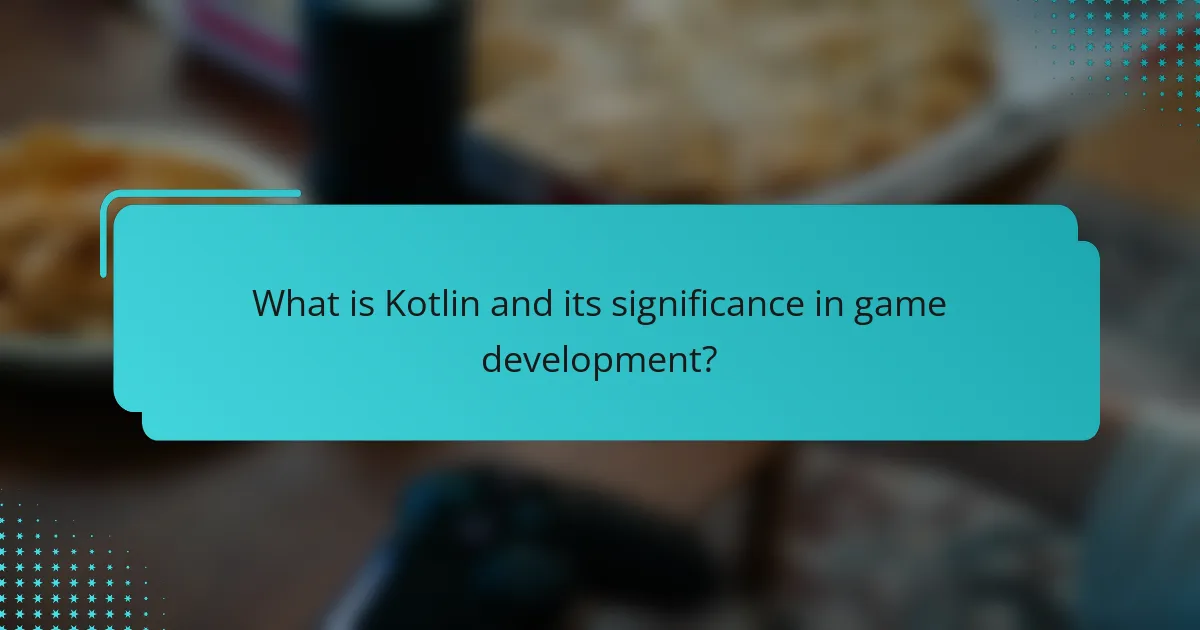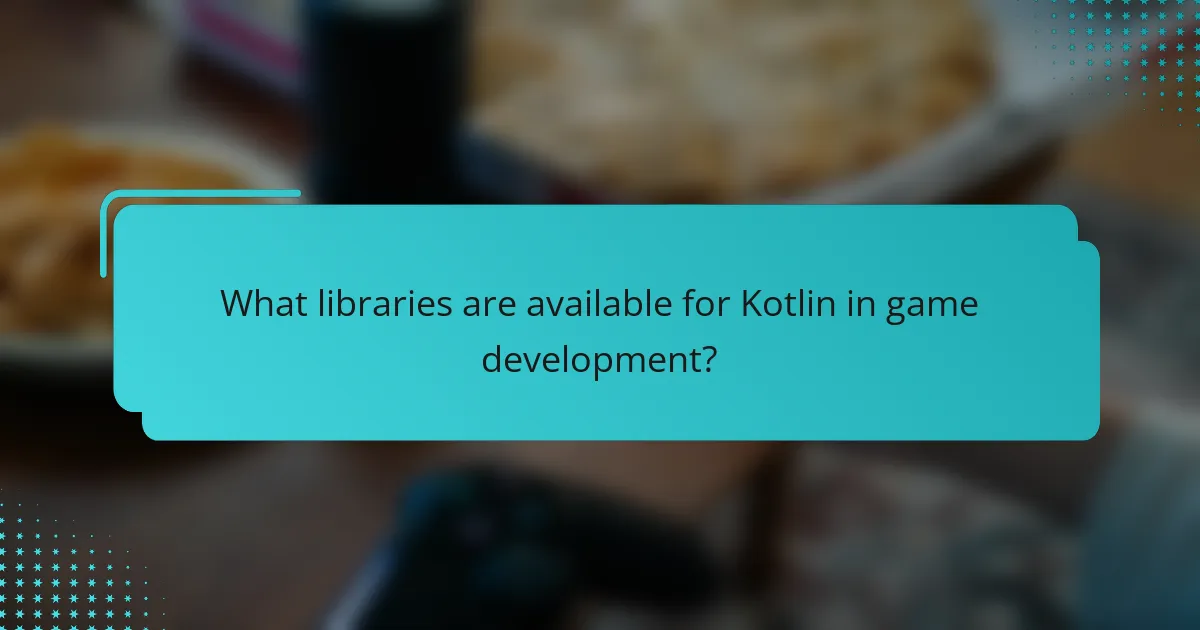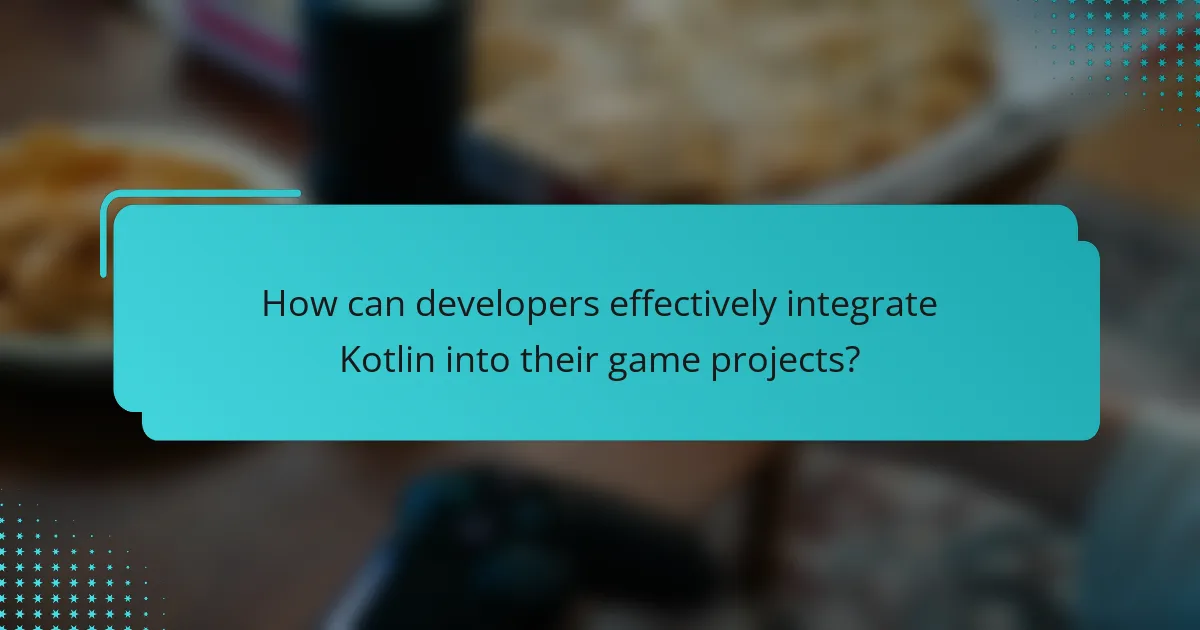
What is Kotlin and its significance in game development?
Kotlin is a modern programming language that runs on the Java Virtual Machine (JVM). It is designed to be fully interoperable with Java. This interoperability allows developers to use existing Java libraries and frameworks seamlessly. Kotlin’s concise syntax improves code readability and reduces boilerplate code. This leads to faster development cycles and fewer bugs. In game development, Kotlin is significant because it enhances productivity for Android game developers. Many popular game engines, such as Unity and LibGDX, support Kotlin. The language’s features, like null safety and extension functions, help prevent common programming errors. Kotlin’s growing community and support further solidify its role in game development.
How does Kotlin enhance Android game development?
Kotlin enhances Android game development by providing concise syntax and improved safety features. Its interoperability with Java allows developers to use existing libraries seamlessly. Kotlin’s null safety reduces runtime crashes, leading to more stable games. The language supports coroutines for asynchronous programming, improving performance in resource-intensive applications. Kotlin’s extension functions enable cleaner code and better organization. Additionally, it integrates well with modern Android development tools like Android Studio. These features collectively streamline the development process and enhance the overall gaming experience.
What unique features of Kotlin facilitate game programming?
Kotlin offers several unique features that facilitate game programming. Its concise syntax reduces boilerplate code, allowing developers to write more efficient code. Kotlin’s null safety feature minimizes runtime crashes by eliminating null pointer exceptions. The language supports functional programming, enabling developers to use higher-order functions and lambda expressions. Kotlin’s interoperability with Java allows seamless integration with existing game libraries. Additionally, Kotlin coroutines simplify asynchronous programming, making it easier to manage game state and performance. These features contribute to a more streamlined and effective game development process.
Why is Kotlin preferred over Java for Android games?
Kotlin is preferred over Java for Android games due to its modern features and enhanced productivity. Kotlin’s concise syntax reduces boilerplate code, making development faster. It supports null safety, which minimizes runtime crashes. Kotlin also offers coroutines for asynchronous programming, improving performance in games. Additionally, Kotlin is fully interoperable with Java, allowing developers to use existing Java libraries. The official support from Google further solidifies its position in Android development. According to a JetBrains survey, 61% of developers prefer Kotlin for new Android projects. This preference is driven by Kotlin’s ability to simplify code and enhance maintainability.
What advantages does Kotlin offer for game developers?
Kotlin offers several advantages for game developers. It provides concise syntax, which reduces boilerplate code. This leads to improved readability and maintainability. Kotlin is fully interoperable with Java, allowing developers to utilize existing Java libraries. It also supports functional programming features, enhancing code expressiveness. Kotlin’s null safety reduces the risk of runtime errors, improving application stability. Additionally, Kotlin has strong community support and extensive documentation. These factors contribute to faster development cycles and better collaboration among developers.
How does Kotlin improve code readability and maintainability?
Kotlin improves code readability and maintainability through its concise syntax and expressive features. The language reduces boilerplate code significantly. This leads to fewer lines of code, making it easier to read and understand. Kotlin’s type inference allows developers to omit explicit types, further simplifying code. Additionally, the use of extension functions enhances code organization. These functions enable developers to add new functionality to existing classes without modifying their source code. Kotlin also supports higher-order functions, promoting a functional programming style. This style encourages cleaner code and better abstraction. Finally, Kotlin’s null safety feature helps prevent common programming errors, enhancing code stability and maintainability.
What performance benefits does Kotlin provide in game development?
Kotlin provides several performance benefits in game development. It offers concise syntax, reducing boilerplate code and enhancing readability. This leads to faster development cycles and easier maintenance. Kotlin’s interoperability with Java allows developers to leverage existing libraries without performance loss. Additionally, Kotlin’s support for coroutines enables efficient asynchronous programming, improving responsiveness in games. The language also compiles to optimized bytecode, ensuring better runtime performance. Overall, these features contribute to smoother gameplay experiences and improved resource management in game applications.

What libraries are available for Kotlin in game development?
Kotlin offers several libraries for game development. Notable libraries include LibGDX, a popular framework for cross-platform game development. Another option is Korge, which is designed specifically for Kotlin and supports 2D and 3D games. Additionally, there is Kotlinx.coroutines for managing asynchronous tasks effectively. These libraries provide essential tools and features for building games efficiently.
Which popular game development libraries support Kotlin?
LibGDX, Unity (with Kotlin bindings), and Cocos2d-x are popular game development libraries that support Kotlin. LibGDX is a versatile framework that allows for cross-platform game development. It offers a rich set of features and is highly compatible with Kotlin. Unity can support Kotlin through Kotlin bindings, enabling developers to use Kotlin alongside C#. Cocos2d-x is another option that supports Kotlin for game development, particularly for mobile games. These libraries provide developers with the tools necessary to create games using Kotlin efficiently.
How can developers leverage LibGDX with Kotlin?
Developers can leverage LibGDX with Kotlin by utilizing Kotlin’s concise syntax and features to enhance game development efficiency. Kotlin’s null safety and extension functions provide robust tools for managing game assets and logic. LibGDX supports Kotlin natively, allowing seamless integration of Kotlin code. Developers can use Kotlin coroutines for asynchronous programming, improving performance in game loops. Additionally, Kotlin’s data classes simplify the creation of game entities and configurations. The combination of LibGDX and Kotlin results in cleaner, more maintainable code. This synergy accelerates development cycles and reduces the likelihood of bugs.
What role does Korge play in Kotlin game development?
Korge is a game development framework designed for Kotlin. It simplifies creating 2D games by providing a rich set of features. Korge supports graphics, audio, and input handling. It allows developers to write code in a concise and expressive manner. The framework is built on Kotlin’s coroutines for asynchronous programming. This improves performance and responsiveness in games. Korge also offers cross-platform capabilities, enabling games to run on multiple devices. Its active community and documentation support further enhance the development experience.
What are the benefits of using libraries in Kotlin game development?
Using libraries in Kotlin game development enhances productivity and simplifies coding. Libraries provide pre-built functions and tools that streamline development processes. This reduces the amount of code developers need to write from scratch.
Kotlin libraries often offer better performance and optimization for specific tasks. They can also improve code readability and maintainability. Many libraries are designed with Kotlin’s features in mind, ensuring seamless integration.
For instance, libraries like LibGDX and Korge are tailored for game development in Kotlin. They include components for graphics, physics, and audio, which are essential for game creation.
Utilizing these libraries can significantly accelerate the development timeline. Developers can focus on unique game features rather than foundational elements. This leads to faster prototyping and iteration in game design.
How do libraries enhance productivity for game developers?
Libraries enhance productivity for game developers by providing pre-built components and functionalities. These libraries reduce the need for developers to write code from scratch. They offer tools for graphics, physics, and user interface design. Popular libraries like LibGDX and Unity simplify complex tasks. By using libraries, developers can focus on game design rather than coding basics. This leads to faster development cycles and improved efficiency. Studies show that leveraging libraries can cut development time significantly. For instance, using pre-existing libraries can reduce coding errors and debugging time.
What libraries are best for specific game genres?
Unity is a leading library for 2D and 3D game development. It supports multiple platforms, including Android. Unreal Engine is another powerful library for high-fidelity 3D games. It excels in graphics and complex gameplay mechanics. For 2D games, LibGDX is highly recommended. It is lightweight and supports multiple platforms. Phaser is an excellent choice for browser-based games. It offers a robust framework for 2D game development. Godot is an open-source library that supports both 2D and 3D games. It is known for its flexibility and ease of use. Each of these libraries caters to specific game genres effectively.

How can developers effectively integrate Kotlin into their game projects?
Developers can effectively integrate Kotlin into their game projects by utilizing its concise syntax and interoperability with Java. Kotlin’s features, such as null safety and extension functions, enhance code quality and reduce bugs. Many game engines, like Unity and LibGDX, support Kotlin, allowing for seamless integration. Developers can leverage Kotlin Coroutines for asynchronous programming, improving performance in game mechanics. Additionally, using Kotlin DSLs simplifies configuration and enhances readability. The Android Game Development Kit (AGDK) provides tools specifically designed for Kotlin, streamlining the development process. Kotlin’s growing community and extensive libraries offer valuable resources and support for developers. These factors collectively facilitate a smoother integration of Kotlin into game projects.
What are the best practices for integrating Kotlin in Android games?
Use Kotlin’s concise syntax to reduce boilerplate code in Android games. This improves readability and maintainability. Leverage Kotlin coroutines for asynchronous programming. Coroutines simplify managing background tasks without blocking the main thread. Utilize extension functions to enhance existing classes. This allows for cleaner and more modular code. Implement data classes for managing game states. Data classes provide built-in methods for comparison and serialization. Take advantage of Kotlin’s null safety features. This helps prevent null pointer exceptions, a common issue in game development. Use libraries like Ktor for networking and Koin for dependency injection. These libraries are designed to work seamlessly with Kotlin. Follow these practices to create efficient and robust Android games.
How can developers transition existing Java projects to Kotlin?
Developers can transition existing Java projects to Kotlin by leveraging Kotlin’s interoperability with Java. This allows gradual migration without needing to rewrite entire codebases. First, developers should add Kotlin support to their project by including Kotlin dependencies in the build configuration. Next, they can convert Java files to Kotlin using the built-in IntelliJ IDEA or Android Studio conversion tool. This tool automatically translates Java syntax to Kotlin while maintaining functionality. Developers can also start writing new code in Kotlin alongside existing Java code. This mixed approach enables testing and gradual adoption of Kotlin features. Additionally, developers should familiarize themselves with Kotlin’s syntax and features to fully utilize its capabilities. Kotlin’s null safety and extension functions can enhance code quality and reduce runtime errors compared to Java. Overall, the transition can be smooth and beneficial, improving code maintainability and developer productivity.
What tools assist in Kotlin integration for game development?
Kotlin integration for game development is supported by several tools. Android Studio is the primary IDE for Kotlin development. It offers built-in support for Kotlin and provides features like code completion and debugging.
LibGDX is a popular game development framework that supports Kotlin. It allows developers to create cross-platform games efficiently. Another tool is Korge, a Kotlin game engine designed for 2D game development.
Unity also supports Kotlin through plugins, allowing for enhanced game scripting. Additionally, Gradle is used for dependency management in Kotlin projects. These tools collectively enhance the Kotlin game development experience.
What common challenges do developers face when using Kotlin?
Common challenges developers face when using Kotlin include learning curve and interoperability issues. Kotlin’s syntax differs from Java, requiring developers to adapt. This adjustment can slow down initial development. Interoperability with existing Java code can lead to complications. Developers may encounter runtime exceptions due to differences in type handling. Tooling support can be inconsistent, affecting debugging and performance. Additionally, some libraries may not fully support Kotlin features, limiting functionality. These challenges can impact productivity and project timelines.
How can developers troubleshoot integration issues with Kotlin?
Developers can troubleshoot integration issues with Kotlin by following systematic debugging steps. First, they should review error messages and logs for specific clues. This helps identify the root cause of the issue. Next, developers can check compatibility between Kotlin versions and libraries being used. Mismatched versions often lead to integration problems.
Additionally, they should ensure that dependencies are correctly configured in the build.gradle file. Incorrect dependency management can cause integration failures. Developers can also use debugging tools like Android Studio’s debugger to step through code. This allows them to pinpoint where the integration breaks down.
Finally, consulting the Kotlin documentation and community forums can provide insights and solutions from other developers who faced similar issues. These resources often contain valuable troubleshooting tips and best practices.
What resources are available for learning Kotlin in game development?
Online courses such as Udacity’s “Kotlin for Android Development” and Coursera’s “Kotlin for Java Developers” provide structured learning paths. Books like “Kotlin Programming: The Big Nerd Ranch Guide” offer in-depth knowledge. Websites like Kotlinlang.org feature official documentation and tutorials. Community forums such as Stack Overflow and Reddit’s r/Kotlin provide peer support. YouTube channels like “The Net Ninja” and “Coding with Mitch” offer practical video tutorials. Additionally, game development platforms like Unity and LibGDX have specific resources for Kotlin integration. These resources collectively enhance understanding and skills in using Kotlin for game development.
What practical tips can enhance Kotlin game development?
Use Kotlin’s concise syntax to reduce boilerplate code. This enhances readability and maintainability. Leverage Kotlin coroutines for efficient asynchronous programming. This approach improves game performance by managing background tasks effectively. Utilize the Kotlin Multiplatform Mobile (KMM) for sharing code between Android and iOS. This allows for a more unified development process. Implement extension functions to add functionality to existing classes. This promotes code reusability and cleaner architecture. Take advantage of the rich ecosystem of libraries available for Kotlin. Libraries like LibGDX provide robust frameworks for game development. Regularly update dependencies to benefit from performance improvements and bug fixes. Keeping packages current is crucial for stability. Finally, engage with the Kotlin community for support and resources. Community contributions can provide valuable insights and solutions.
Kotlin is a modern programming language that enhances game development, particularly for Android. This article explores Kotlin’s significance in game development, highlighting its advantages such as concise syntax, null safety, and interoperability with Java. Key libraries like LibGDX and Korge are discussed, along with practical integration tips and best practices for developers. The content provides insights into how Kotlin improves productivity, code readability, and performance in game programming, making it a preferred choice over Java for many developers.